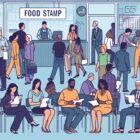Why Are SNAP Benefits Vital for Homeless Individuals?

You may not realize it, but SNAP benefits can be a lifeline for homeless individuals.
In a world where hunger and food insecurity are all too common, these benefits offer access to nutritious food and a pathway to stability and self-sufficiency.
By addressing the immediate needs of the homeless population, SNAP benefits have the power to improve health and well-being, combat food insecurity, and provide a glimmer of hope for a brighter future.
Key Takeaways
- SNAP benefits reduce hunger for homeless individuals.
- SNAP benefits provide access to sufficient nutritious food.
- SNAP benefits alleviate the stress of not knowing where the next meal will come from.
- SNAP benefits promote self-sufficiency and empower individuals to make their own food choices.
The Impact of SNAP Benefits on Hunger
SNAP benefits can significantly reduce hunger for homeless individuals by providing them with access to a sufficient amount of nutritious food. When you’re experiencing homelessness, finding enough food to eat can be a constant struggle. SNAP benefits, also known as food stamps, can make a significant difference in your ability to have regular meals and alleviate some of the stress associated with not knowing where your next meal will come from.
With SNAP benefits, you can purchase a variety of food items that meet your dietary needs. This means that you can have access to fruits, vegetables, grains, dairy, and other essential food groups that contribute to a balanced diet. Having access to a sufficient amount of nutritious food can help improve your overall health and well-being.
Furthermore, SNAP benefits can also help you stretch your food budget. When you receive these benefits, you can plan your meals better and ensure that you’re making the most out of your limited resources. This can lead to less food waste and more efficient use of the funds available to you.
Access to Nutritious Food for Homeless Individuals
How can homeless individuals ensure access to nutritious food?
For those experiencing homelessness, finding a reliable source of nutritious food can be a constant challenge. Without a stable living situation, access to meals that meet their nutritional needs becomes even more difficult. However, there are options available to help address this issue.
One way homeless individuals can ensure access to nutritious food is by utilizing community resources such as food banks, soup kitchens, and shelters that provide meals. These organizations often rely on donations from individuals, businesses, and government programs to offer balanced meals to those in need. Additionally, some cities have mobile food pantries that travel to areas with high homeless populations, making it more convenient for individuals to access nutritious food.
Another option is to take advantage of government assistance programs like the Supplemental Nutrition Assistance Program (SNAP). SNAP benefits can provide individuals with the means to purchase food at grocery stores, allowing them to choose foods that align with their dietary needs. This program not only helps homeless individuals access nutritious food, but it also promotes self-sufficiency and empowers individuals to make their own choices regarding their diet.
Improving Health and Well-Being Through SNAP Benefits
By utilizing SNAP benefits, you can significantly improve your health and overall well-being. SNAP provides you with access to nutritious food, which is essential for maintaining a healthy lifestyle. When you have access to fresh fruits, vegetables, whole grains, and lean proteins, you’re more likely to meet your nutritional needs and reduce the risk of developing chronic diseases such as obesity, diabetes, and heart disease.
Adequate nutrition plays a crucial role in supporting your immune system, helping you fight off illnesses and infections. By consuming a balanced diet, you can enhance your body’s ability to recover from illnesses and injuries. Additionally, accessing nutritious food through SNAP benefits can positively impact your mental well-being. Proper nutrition has been linked to better cognitive function, improved mood, and reduced symptoms of depression and anxiety.
Moreover, SNAP benefits can help alleviate the stress and uncertainty associated with not knowing where your next meal will come from. When you have access to consistent and reliable food assistance, you can focus on other aspects of your life, such as finding stable housing or seeking employment. This stability can lead to improved overall well-being and a better quality of life.
Combating Food Insecurity Among the Homeless Population
When you experience homelessness, ensuring access to regular and reliable food becomes a critical component in addressing food insecurity. Combating food insecurity among the homeless population is a complex issue that requires comprehensive solutions. Homelessness often leads to limited resources, making it challenging to obtain nutritious meals on a consistent basis. Lack of access to food can have severe consequences on physical and mental health, exacerbating the already difficult circumstances faced by individuals experiencing homelessness.
To combat food insecurity, various initiatives are being implemented. Homeless shelters and soup kitchens play a crucial role in providing immediate relief by offering meals to those in need. Additionally, community organizations and non-profits collaborate to distribute food through mobile food pantries and outreach programs. These efforts aim to ensure that homeless individuals have access to nutritious meals regularly.
Government assistance programs, such as the Supplemental Nutrition Assistance Program (SNAP), are also vital in combating food insecurity among the homeless population. SNAP benefits provide eligible individuals with funds to purchase food, allowing them to have greater control and choice over their meals. Moreover, SNAP benefits can help individuals maintain a sense of dignity and empowerment by allowing them to make their own food choices.
SNAP Benefits as a Pathway to Stability and Self-sufficiency
Achieving stability and self-sufficiency becomes more attainable for homeless individuals with the assistance of SNAP benefits. These benefits not only provide crucial access to nutritious food but also serve as a stepping stone towards a better future. Here are three ways in which SNAP benefits can help homeless individuals on their journey to stability and self-sufficiency:
- Meeting basic needs: SNAP benefits ensure that homeless individuals have access to regular meals, reducing the stress and uncertainty of finding their next meal. This stability allows them to focus on other aspects of their lives, such as securing employment or finding permanent housing.
- Building financial skills: SNAP benefits can be seen as a tool that helps individuals develop financial literacy. By learning how to budget and manage their benefits effectively, homeless individuals can gain valuable skills that are necessary for long-term stability and self-sufficiency.
- Creating a sense of dignity: Homelessness often strips individuals of their sense of dignity and self-worth. SNAP benefits provide a means for homeless individuals to regain a sense of control over their lives, allowing them to make choices about the food they consume and providing a sense of normalcy and dignity.
Frequently Asked Questions
How Can Homeless Individuals Apply for SNAP Benefits?
You can apply for SNAP benefits as a homeless individual by visiting your local SNAP office or applying online. It’s important to provide documentation and proof of your current situation to be eligible.
What Are the Income Eligibility Requirements for SNAP Benefits for Homeless Individuals?
To qualify for SNAP benefits as a homeless individual, you must meet the income eligibility requirements. These requirements take into account your household size and income level.
Are There Any Restrictions on the Types of Food That Can Be Purchased With SNAP Benefits?
Yes, there are restrictions on the types of food you can purchase with SNAP benefits. Items like alcohol, tobacco, and hot prepared foods cannot be bought. The program aims to support nutritious choices.
Can Homeless Individuals Receive SNAP Benefits if They Are Staying in a Homeless Shelter or Transitional Housing?
Yes, homeless individuals can receive SNAP benefits if they are staying in a homeless shelter or transitional housing. It helps provide them with access to nutritious food and support during difficult times.
How Long Can Homeless Individuals Receive SNAP Benefits?
You can receive SNAP benefits as a homeless individual for as long as you meet the eligibility criteria. The duration of these benefits can vary depending on your circumstances and the specific rules of your state.



